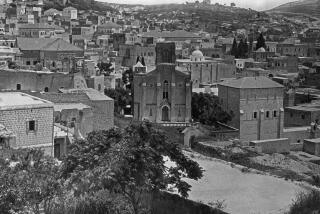Hero Refused to Turn Away From Persecuted : Holocaust: After more than four decades of obscurity, Giorgio Perlasca has been honored for protecting thousands of Jews in Budapest.
- Share via
In the waning days of World War II, Giorgio Perlasca bore witness to many atrocities. This is just one of them:
On the night of Dec. 29, 1944, Perlasca, an Italian businessman in Axis-allied Hungary, could hear shots and shrieks coming from the Jewish ghetto. The next morning he was entrusted with the care of a survivor--a Jewish girl naked except for an army overcoat. She told him that the victims had been tied together with barbed wire two by two, then forced by Nazis to walk naked through the snow from the ghetto to the Danube.
There they were made to kneel on the riverbank, where each was killed by a shot in the neck. She had survived because the barbed wire that tied her to her sister had come loose. Realizing that one of them had a chance, they had agreed that both would fall into the river with the first shot.
Somehow, she swam to a bridge, climbed out and hid under a tree, where she was found by a member of the Hungarian military, who covered her and handed her over to Perlasca, a known protector of Jews.
Perlasca willingly recounts each detail--but not how it made him feel. He had long before numbed himself to the everyday horror of the Holocaust.
“At that point, nothing was new,” he said. “We were used to that kind of thing. But we were happy to bring her home. She didn’t even have a cold.”
In a September ceremony sponsored by the U.S. Holocaust Memorial Council and the Italian Embassy, Perlasca, 80, was the first to receive the council’s highest honor, its Medal of Remembrance, for his activities protecting the Jews of Budapest.
Until three years ago, when he was recognized by the Yad Vashem Holocaust Memorial in Jerusalem as one of the Righteous Among the Nations of the World, he was virtually unknown. Even his wife, Romilda, found his wartime stories hard to believe when he returned to Italy.
Now he is offhand, even embarrassed about all the attention. A private man, he does not want to talk about the personal impact of his experiences in Budapest. Things happened so quickly then, he maintains. There was no time to think, to reflect, to be fearful.
“I wasn’t scared because I didn’t have time to be afraid,” he recalled. “As far as I was concerned, I was sure of the rightness of what I was doing, and I was sure things would go well. Unfortunately, they didn’t. I wanted to do more.”
Perlasca, who was interviewed through an interpreter in Washington, was the representative of an Italian meat company in Eastern Europe. His life was like a traveling salesman’s. He moved a lot, didn’t see his wife much and when he wasn’t traveling, he worked out of offices in a Budapest hotel.
Then in March, 1944, the war came to Hungary, and with it, Perlasca’s life changed. By October, protected by and acting for the Spanish Legation in Budapest, he would become responsible for the health and safety of thousands of Hungarian Jews threatened with deportation by the German occupation.
Perlasca had already encountered difficulties with the government for having tried to protect the cargo he was sending to Italy from being declared war booty.
In 1943, worried but unable to return home--he would have had to go through Germany and was fearful that he’d be picked up at the border--he initially sought Spanish protection. (As a soldier in an Italian regiment fighting for Franco during the Spanish Civil War, he’d been told to seek Spanish assistance if he ever needed it.)
But in the spring, before he was able to pick up his papers, he was interned as an Italian loyal to the government of the king of Italy.
Internees were well treated--even to luxuries such as pocket money and tea and cookies in the afternoon. Nevertheless, in October, he and a friend managed to escape and he made his way back to the Spanish Legation. “I wanted to survive,” he said. “With a Spanish passport I felt set.”
When he went to pick up his passport, he saw throngs of Jews besieging the Spaniards for protection. By that time, the legation--like those of other neutral nations--was already officially protecting 300 Jews.
Without thinking beyond the needs of the moment, he plunged in. “I saw the legation needed Christian personnel,” he remembered. Everyone but the charge d’affaires “was a Jewish refugee.”
Angel Sanz-Briz, the Spanish charge d’affaires, explained that they couldn’t pay him, but that was OK with Perlasca. He had enough money, a couple of places to live, and he felt a moral obligation to help the country that was protecting him by giving him citizenship.
Sanz-Briz and Perlasca immediately went to the Hungarian Ministry of Foreign Affairs with two letters: one that identified him as an employee of the Spanish Legation and another that declared he was responsible for the Jews it was protecting.
He started to work--at what, he didn’t know. The Jews needed food, shelter and at least the appearance of legitimacy.
Did he realize that he was risking his life? “I don’t think so,” he said. “I didn’t have time to think. If I had, I don’t know what I would have done or how I would have behaved.”
Once the work started, he had even less time to think or for that matter to eat. He would lose 35 pounds in the next three months. As nothing had actually been organized, it was all his job: renting additional houses and apartment buildings, obtaining Spanish flags for the houses as well as for the large car in which he defiantly visited his protectees every day, making his presence not only obvious but virtually normal. The message he sent out was clear: The people in his houses were protected by Madrid.
The number of Jews involved remains unclear, but Perlasca recalled that Hungarian newspapers of the day talked of 5,200 Jews under Spanish protection--and all in 11 buildings where conditions were poor, food and water scarce. “The buildings were very crowded. People even lived in the stairways,” he recalls.
Perlasca estimates there were probably more than 5,200, and few who sought his aid were turned away. He even used his own money to obtain food when there was no other choice. When asked now if he had a particular talent for organizing people, he said: “I don’t know if I did it well.I just did what I knew how to do.”
Little in his life had prepared him for this. Born in Como in North Italy, he was raised a Catholic in what he persistently describes today as a normal family.
The six children were brought up with the basic feeling that all men are “more or less” equal. (“You have to make some distinctions,” he explained. “I don’t consider someone who arrests and rapes young girls the same as me.”)
His father, who had a law degree, was a municipal secretary actively involved in his community. As a young man in Padua, Perlasca had several Jewish friends. But by 1944, he was mostly a man in his mid-30s trying to make a living in wartime Europe.
Ramrod straight now, his dignified bearing, blue eyes and concern that he be able to shave properly before he has his picture taken make it easy to imagine the handsome young man he was when fate presented him with an opportunity to define himself.
“He was a stranger in a strange country,” said Miles Lerman, the chairman of the Holocaust Council’s international relations committee, who sought out Perlasca a year ago, soon after learning about his activities. “He could have let the whole thing pass him by without taking risks, and like the rest of world stood idly by. He chose not to do that.”
In late November, Sanz-Briz was recalled. Perlasca was distraught. All they had worked for could be lost. The Germans had already started to empty the buildings under Spanish protection.
With his Spanish credentials in hand, Perlasca made a daring choice: He told the authorities he was the new Spanish charge d’affaires. “I simply said I was the legal substitute. If I hadn’t said that, they would have taken everyone away.”
He remembered having no particular plan, no extraordinary inspiration. “It was no special courage,” he said. “It was just the result of events. I am not a hero. I am embarrassed by all this talk of courage.”
Nevertheless, his tactics were not those of the timid. He regularly sought out audiences with German and Hungarian officials, somehow finding ways to retrieve Jews in custody. He combed the streets looking for those who needed help. He pointed out to Hungarians what could happen to their countrymen living in Spain if the governments crossed swords.
His success and luck was considerable, perhaps as much as the better known Raoul Wallenberg, who was also in Budapest then, giving out letters of protection from a neutral nation (Sweden), and who in early January, 1945, asked Perlasca for protection. Perlasca agreed, but Wallenberg never turned up. Perlasca did not see him again.
With the Soviet conquest of Budapest in February, Perlasca’s activities ended. “At first they wanted to hang me,” he remembered. Instead, for a while, he was forced to clean the streets and bury corpses. “But then I escaped. I’ve made that an art.”
Eventually, he made his way back to Italy. When he returned, his family and former employer found his stories barely credible. For 43 years, his work went unheralded. Three years ago, when he was contacted by Israeli officials, his family started to believe him. “And when they heard about this party, they were speechless,” he said.
From the Holocaust Council’s point of view, its honor will not only validate Perlasca’s experience, but prove that there were responses to the Holocaust other than turning away. Lerman said, “Perlasca’s story proves that even under the most dreadful conditions, people can act in a godly manner if they choose to.”
But the question remains: Why did he do it? He doesn’t know. He feels his activities were simply prompted by events. And that what he did to respond to those events was the decent thing to do.
Now, after more than four decades of obscurity, perhaps there is a desire to relive those moments when his life ensured the lives of others. Perhaps there is a desire to be remembered.
All Perlasca is sure of is that those days must be remembered.
More to Read
Sign up for Essential California
The most important California stories and recommendations in your inbox every morning.
You may occasionally receive promotional content from the Los Angeles Times.













